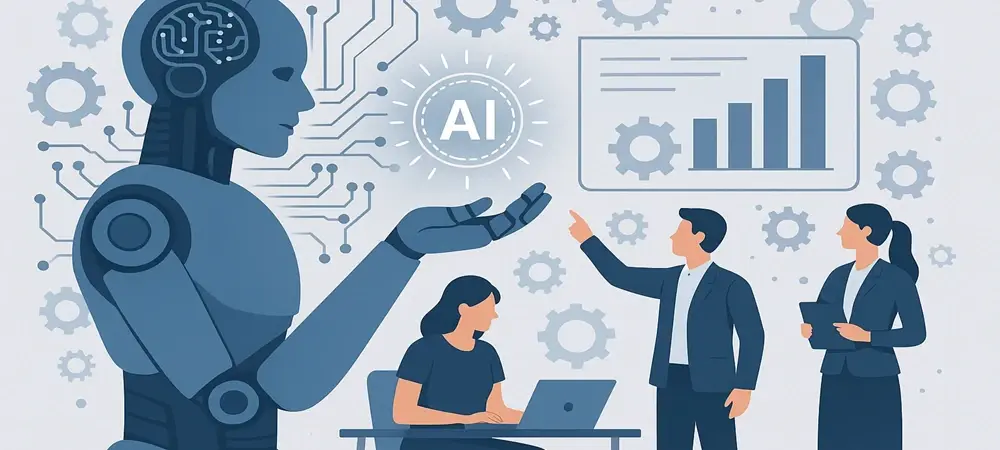In the contemporary business environment, Artificial Intelligence is not just a technological advancement but a transformative force with profound implications for the workforce. Companies across the globe are adopting AI to improve efficiencies, boost productivity, and gain competitive advantages. However, the potential advantages of AI come with a formidable challenge: its impact on the workforce. This presents a unique opportunity and responsibility for Human Resources. HR’s role extends beyond traditional responsibilities, now encompassing the critical task of managing change within this tech-driven landscape. The transition towards an AI-enabled workforce necessitates not only new skillsets but also an evolved workplace culture that embraces these changes. HR professionals are tasked with navigating this intricate process of integrating AI while ensuring the workforce remains engaged and motivated. This delicate balance is crucial in driving the success of AI initiatives, transforming employee roles and organizational dynamics.
Embracing The Human Element in AI Initiatives
Human Resources must approach AI-driven transformations with an empathetic understanding that places human concerns at the center of technological progress. This shift demands that HR practitioners focus on dispelling fears associated with AI by reframing it as a tool that enhances, rather than threatens, human employment. It’s vital to communicate clearly how AI can free employees from monotonous tasks, enabling them to devote more time to creative and strategic endeavors that add greater value to the organization. Historically, many AI initiatives have stumbled, not due to technological failure but because of a shortfall in managing the human aspect of the change. A successful transformation hinges on fostering a workplace culture where AI is seen as an ally to human efforts. This requires HR to actively engage with employees, actively listening to their concerns while building robust communication channels. Aligning AI initiatives with the workforce’s goals can ease the transition, promising enhanced job satisfaction and innovative productivity.
As companies implement AI, training and reskilling become pivotal aspects of maintaining a competitive workforce. HR must devise innovative training programs that equip employees with the skills necessary to work alongside AI technologies effectively. This is where HR’s strategic vision becomes crucial—creating career development paths that are interwoven with AI advancements ensures employees see clear benefits from the transition, reinforcing job satisfaction and loyalty. By nurturing an environment where the workforce actively participates in shaping the AI transformation, HR can cultivate a culture of empowerment. This marks a departure from the often hierarchical nature of technological implementations, promoting inclusivity and innovation. Prioritizing ethical concerns is also an inherent part of the HR strategy, ensuring that AI tools are implemented in a way that respects privacy and fairness, thereby ensuring employee trust and acceptance.
The Strategic Role of HR in Facilitating Change
HR’s strategic role in AI-driven transformation involves acting as a bridge between technical teams and the broader workforce, ensuring that changes are aligned with organizational goals and employee expectations. This transitional period requires HR to champion transparent communication between leadership and employees, fostering a sense of shared purpose and understanding. HR must facilitate dialogues that address the implications of AI adoption, breaking down silos by encouraging interaction and collaboration across various levels of the organization. These efforts contribute to an overarching strategy where employees feel connected to the organization’s mission, reducing resistance and increasing acceptance of AI integration. A critical factor in the success of AI projects is HR’s ability to manage change inclusively, bringing diverse perspectives into strategic conversations. This process not only enriches decision-making but also ensures that the transformation reflects the collective wisdom of the organization.
Moreover, HR’s role extends to the ethical considerations surrounding AI use, guiding the formulation of frameworks that govern AI deployment responsibly. By setting clear guidelines and practices for ethical AI usage, HR helps protect the organization from potential pitfalls associated with biased algorithms or privacy violations. HR’s involvement in this aspect ensures that the company’s AI strategy aligns with broader corporate values and societal norms. Part of HR’s challenge lies in integrating these ethical dimensions into the company’s culture, making ethical standards an inherent part of everyday operations. With thoughtful management, HR can navigate the complexities of AI integration, ensuring it serves as a transformative force that aligns human talent with technological innovation. As AI redefines workforce dynamics, the HR department commits to fostering an empowered, engaged, and ethically driven workforce capable of thriving in an AI-enriched future.
Moving Forward with AI-Driven Transformation
In today’s business world, Artificial Intelligence (AI) is no longer just another technological innovation. It is a groundbreaking force changing the workforce landscape. Globally, companies are integrating AI to enhance efficiency, elevate productivity, and secure a competitive edge. Yet, these potential benefits of AI bring significant challenges, particularly its effects on employees. This scenario presents a distinctive opportunity and responsibility for Human Resources (HR). HR must now look beyond traditional roles to manage the complex transition in this high-tech era. Adapting to an AI-driven workforce calls for not only the acquisition of new skills but also a shift in workplace culture to accept these technological changes. HR professionals play a pivotal role in guiding this transformation, ensuring employees stay engaged and motivated amidst these shifts. This fine balance is essential for the success of AI initiatives, as they reshape employee roles and influence organizational dynamics.

